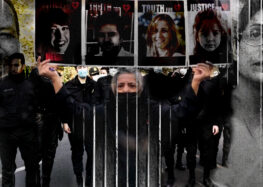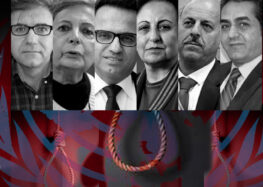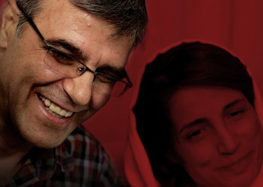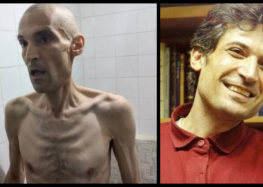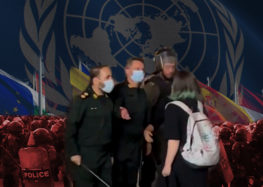Top PEN Prize to Honor Nasrin Sotoudeh, Jailed Iranian Lawyer, Writer, and Women’s Rights Advocate
FOR IMMEDIATE RELEASE
For more information contact:
Larry Siems, (212) 334-1660 ext. 105, [email protected]
Sarah Hoffman, (212) 334-1669 ext. 111, [email protected]
Top PEN Prize to Honor Nasrin Sotoudeh, Jailed Iranian Lawyer, Writer, and Women’s Rights Advocate
Nobel Peace Prize Laureate Shirin Ebadi to Represent Imprisoned Colleague at Ceremony
New York City, April 13, 2011—PEN American Center today named Nasrin Sotoudeh, a writer, lawyer, and leader of the women’s and children’s rights movement in Iran, as the recipient of its 2011 PEN/Barbara Goldsmith Freedom to Write Award. Sotoudeh was arrested on September 4, 2010, and is now serving an 11-year sentence for her outspoken advocacy in defense of her clients arrested after the June 2009 presidential elections and interviews she gave to human rights organizations and media about their cases.
The award, which honors international literary figures who have been persecuted or imprisoned for exercising or defending the right to freedom of expression, will be presented at PEN’s Annual Gala on April 26, 2011, at the American Museum of Natural History in New York City. Nobel Peace Prize laureate Shirin Ebadi, a close friend and associate of Ms. Sotoudeh, will attend the PEN Gala on April 26, 2011, and receive the award on her behalf. Ms. Ebadi, who is the author of Iran Awakening and the newly released memoir The Golden Cage: Three Brothers, Three Choices, One Destiny, will be available for interviews in conjunction with the event.
“Nasrin Sotoudeh not only embodies the spirit of the PEN/Barbara Goldsmith Freedom to Write Award, but also the spirit of this remarkable year,” said Kwame Anthony Appiah, president of PEN American Center. “As a writer, as an activist, and as a lawyer she has dedicated herself to a simple and powerful idea: the principle that the rights guaranteed by law are absolute and shared equally by all. At a moment when women and men around the world are standing together peacefully to reclaim this most basic truth, she is in one of the world’s most infamous prisons, to the great shame of the Iranian government. In honoring her with this award, we stand with the millions of Iranians she has stood up for and inspired, and we urge individuals and governments around the world to join us in pressing for her immediate release.”
Nasrin Sotoudeh, who is 47 and the mother of two young children, began her activism in 1991 as the only female writer for the Nationalist-religious publication Daricheh Goftegoo; one of her first projects was to prepare a series of interviews, reports, and articles on Iranian women to mark International Women’s Day, all of which her editor refused to run. After completing her Master’s Degree in International Law at Shahid Behshti University, Sotoudeh passed the bar exam in 1995 but was not permitted to practice law for another eight years, and so she concentrated on journalism instead, writing for several reformist newspapers, including Jame’e. When she was finally granted a law license in 2003, she specialized in women’s and children’s rights while continuing to write articles addressing these issues. Her clients have included women’s rights activists, among them the organizers of the grassroots, door-to-door One Million Signatures Campaign; journalists such as Isa Sharkhiz; political activists such as Hashmat Tabarzadi, head of Iran’s banned opposition group the Democratic Front; and Shirin Ebadi herself. She has also represented prisoners sentenced to death for crimes committed when they were minors and many Iranian opposition activists arrested in the crackdown following the June 12, 2009 presidential elections.
On August 29, 2010, security officers raided Sotoudeh’s home and office, confiscating several of her files and documents. Authorities also froze her assets. On September 4, 2010, she was summoned to the special court in Evin prison and arrested on charges of “propaganda against the state,” “cooperating with the Human Rights Defenders Center,” and “conspiracy to disturb order.” She was denied access to her lawyer and was restricted family visits for the first several months of her detention.
On January 9, 2011, Branch 26 of the Revolutionary Court sentenced Sotoudeh to a total of 11 years in prison—one year for “propaganda against the regime,” and a total of 10 years for the two charges of “acting against national security” and “violating the Islamic dress code (Hijab) in a filmed speech.” The court also banned her from practicing law and from traveling outside the country for 20 years, a term that begins after her release from prison and that for all intents and purposes confines her to Iran and bars her from her profession for life.
Sotoudeh has gone on several hunger strikes since her arrest, refusing even water during one 11-day stretch, to protest her detention and ill-treatment inside Evin Prison. She has reportedly lost a considerable amount of weight and is in poor health. She is being held in Ward 209 of Evin Prison, where she has spent much of the time in solitary confinement. Sotoudeh is still awaiting a decision in the court of appeals.
In announcing the award today in New York, Freedom to Write Program Director Larry Siems praised Nasrin Sotoudeh’s “unyielding spirit in her fight for justice, equality, and the rule of law in Iran.”
“From the start, Nasrin Sotoudeh has insisted on voicing the unspoken realities of post-revolutionary Iran,” Siems said. “The struggles of women, the experiences of minors swept up in Iran’s judicial system, the aspirations of writers, journalists and ordinary Iranians to engage in free and open debate about their country’s future—Nasrin has risked her own freedom to make sure these are acknowledged in Iran. That they have been acknowledged by sending her to prison speaks volumes about the Iranian leadership; that she is a hero and an inspiration to millions of her countrymen says even more about the Iranian people.”
Siems joined Appiah in urging the Obama administration to press Iranian authorities to bring their country into step with the human rights revolutions sweeping through the Middle East and release Sotoudeh, one of the most visible symbols of these universal values in Iran. “President Ahmadinejad has repeatedly praised the popular uprisings in the region while at the same time Iran’s security forces have been brutally suppressing peaceful demonstrations and dissent in Iran. This hypocrisy is lost on no one, at home or abroad.”
Writer, historian and PEN Member Barbara Goldsmith underwrites the PEN/Barbara Goldsmith Freedom to Write Award. This is the 25th year the award has honored an international literary figure who has been persecuted or imprisoned for exercising or defending the right to freedom of expression. Candidates are nominated by PEN International and any of its 145 constituent PEN centers around the world, and screened by PEN American Center and an Advisory Board comprising some of the most distinguished experts in the field. The Advisory Board for the PEN/Barbara Goldsmith Freedom to Write Award includes Carroll Bogert, Associate Director of Human Rights Watch; Vartan Gregorian, President of the Carnegie Corporation; Joanne Leedom-Ackerman, International Vice President of PEN International; Aryeh Neier, President of the Open Society Institute; and Joel Simon, Executive Director of the Committee to Protect Journalists.
The Freedom to Write Award is an extension of PEN’s year-round advocacy on behalf of the more than 900 writers and journalists who are currently threatened or in prison. Forty-five women and men have received the award since 1987; 32 of the 36 honorees who were in prison at the time they were honored were subsequently released.
PEN American Center is the largest of the 145 centers of PEN International, the world’s oldest human rights organization and the oldest international literary organization. The Freedom to Write Program of PEN American Center works to protect the freedom of the written word wherever it is imperiled. It defends writers and journalists from all over the world who are imprisoned, threatened, persecuted, or attacked in the course of carrying out their profession. For more information on PEN’s work, please visit www.pen.org


